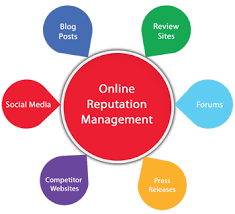In today’s digital-first world, a brand’s online reputation can significantly influence its success. A single negative review or social media post can impact consumer trust and purchasing decisions. Therefore, understanding and implementing effective Online Reputation Management strategies is crucial for businesses operating in India.

Why ORM Matters in India
-
Influence on Consumer Decisions: According to a survey by LocalCircles, 85% of Indian consumers trust online reviews as much as personal recommendations.
-
Cultural Sensitivity: India’s diverse cultural landscape means that negative content can spread rapidly, making it essential for brands to address issues promptly and appropriately.
-
Platform Diversity: From social media platforms like Facebook and Instagram to review sites like MouthShut and Glassdoor, businesses need to monitor and manage their presence across various platforms.
🛠️ Effective ORM Strategies for Indian Businesses
1. Proactive Monitoring
Utilize tools like Google Alerts, Reputology, or Brand24 to monitor brand mentions across the internet. Regularly audit your online profiles to ensure consistency and accuracy of business information.
2. Engage with Your Audience
Respond promptly to customer reviews and feedback, both positive and negative. Engaging with customers shows that you value their opinions and are committed to improving your services.
3. Encourage Positive Reviews
Actively request satisfied customers to leave positive reviews. Offering incentives, such as discounts or exclusive offers, can motivate customers to share their positive experiences .
4. Address Negative Feedback Professionally
Respond to negative reviews with professionalism and empathy. Acknowledge the issue, apologize if necessary, and outline steps taken to resolve the problem. This approach can turn a dissatisfied customer into a loyal one.
5. Promote Positive Content
Regularly publish blogs, press releases, and social media posts that highlight your brand’s achievements, customer testimonials, and industry expertise. This content can push down negative search results and improve your brand’s online image.
6. Leverage Influencer Partnerships
Collaborate with influencers who align with your brand values to enhance credibility. Influencers can sway public opinion significantly, helping to restore your brand’s image during a PR crisis .
🤖 The Role of AI in Online Reputation Management
Artificial Intelligence (AI) has revolutionized Online Reputation Management by offering advanced tools and technologies to streamline processes and deliver actionable insights. AI-powered tools can analyze sentiment, track brand mentions, and even predict potential reputation crises before they escalate .
📈 ORM Best Practices for Indian Businesses
-
Consistency Across Platforms: Ensure that your business information is consistent across all online platforms, including your website, social media profiles, and review sites.
-
Cultural Sensitivity: Tailor your communication to respect regional sentiments and avoid cultural faux pas.
-
Timely Responses: Address customer feedback promptly to demonstrate your commitment to customer satisfaction.
-
Transparency: Be open about any issues and the steps taken to resolve them.
🏢 Regulatory Oversight in India
The Advertising Standards Council of India (ASCI) is a self-regulatory organization that ensures advertisements conform to its Code for Self-Regulation. ASCI looks into complaints across all media, including the internet, to protect consumer interests .
🌟 Unique Online Reputation Management Strategies for Indian Businesses
1. Localized ORM with Regional Influencers
India’s diverse linguistic and cultural landscape necessitates region-specific ORM strategies. Collaborating with regional influencers who resonate with local audiences can help address negative sentiments and build trust. For instance, partnering with influencers who communicate in regional languages can enhance authenticity and relatability.
2. Leveraging Employee Advocacy
Encouraging employees to share positive experiences and company achievements on their personal social media platforms can humanize the brand and foster trust. Employee advocacy programs not only amplify positive content but also showcase the company’s internal culture and values.
3. Implementing Structured Data for Enhanced Visibility
Utilizing structured data (Schema Markup) helps search engines understand the content of your website more effectively, leading to better visibility in search results. This technical SEO practice can improve the appearance of your brand in search snippets, enhancing click-through rates and online reputation.
Conducting regular crisis simulation exercises prepares your team to respond swiftly and effectively during a reputation crisis. These drills help in refining communication strategies, identifying potential vulnerabilities, and ensuring a coordinated response across all channels.
5. Engaging in Social Listening
Implementing social listening tools allows businesses to monitor conversations around their brand in real-time. By analyzing customer sentiments and feedback, companies can proactively address concerns, identify emerging issues, and engage with their audience more effectively.
📈 Advanced Online Reputation Management Tools and Techniques
-
AI-Powered Sentiment Analysis: Utilize artificial intelligence to analyze customer feedback and reviews, categorizing them as positive, negative, or neutral. This helps in prioritizing responses and identifying areas for improvement.
-
Reputation Monitoring Dashboards: Implement centralized dashboards that aggregate data from various platforms, providing a comprehensive view of your brand’s online reputation. These dashboards can track metrics like sentiment scores, review ratings, and social media mentions.
-
Automated Review Request Systems: Set up automated systems that request feedback from customers post-purchase or post-service. This ensures a steady stream of reviews, helping to balance any negative feedback with positive testimonials.
🛡️ Legal Considerations in Online Reputation Management
Understanding the legal landscape is crucial for Online Reputation Management in India. The Information Technology (Reasonable Security Practices and Procedures and Sensitive Personal Data or Information) Rules, 2011, mandate that businesses protect customer data and respond to grievances promptly. Non-compliance can lead to legal repercussions and damage to reputation.
🏆 Case Study: Swiggy’s #VoiceofHunger Campaign
Swiggy, a leading food delivery platform in India, launched the #VoiceofHunger campaign, encouraging users to send voice notes describing their hunger pangs. This innovative approach not only engaged customers but also humanized the brand, leading to increased positive sentiment and brand loyalty.
🧠 1. The Anatomy of Online Reputation Management
This infographic provides a comprehensive breakdown of ORM components, including monitoring, response strategies, and content creation. It’s particularly useful for illustrating the multifaceted nature of ORM.
📊 2. 8 Keys for Effective Online Reputation Management
This visual guide outlines eight essential strategies for managing online reputation, such as monitoring brand mentions, responding to reviews, and engaging with customers on social media.
🛠️ 3. Online Reputation Management Services Mind Map
This mind map infographic details various ORM services, including review management, crisis response, and content creation, providing a clear overview of ORM strategies.
📈 4. Why Your Company’s Online Reputation Matters
This infographic highlights the impact of online reputation on consumer behavior and business success, emphasizing the importance of maintaining a positive online presence.
✅ Conclusion
In the dynamic digital landscape of India, proactive and culturally attuned Online Reputation Management strategies are essential for businesses to maintain a positive online reputation. By leveraging localized approaches, advanced tools, and legal compliance, companies can navigate challenges and build lasting trust with their audience.
If you require assistance in developing a tailored Online Reputation Management strategy or implementing these techniques, feel free to reach out for expert guidance.




